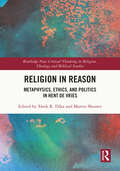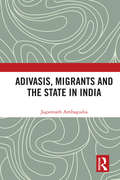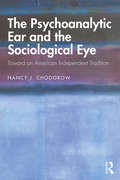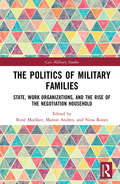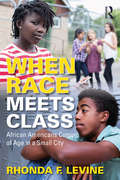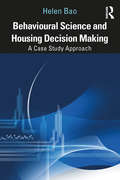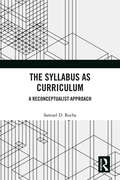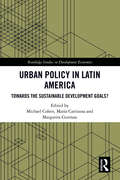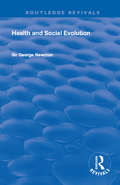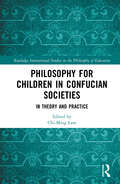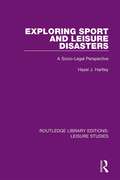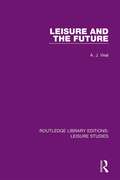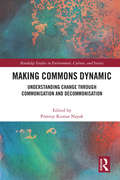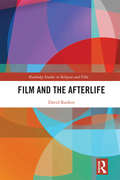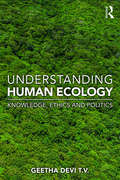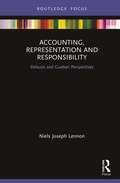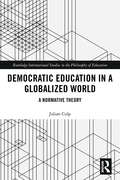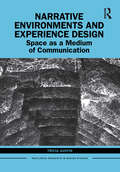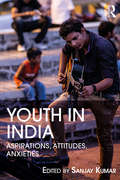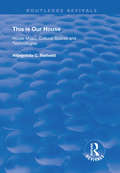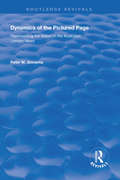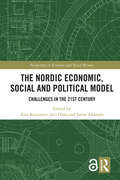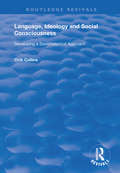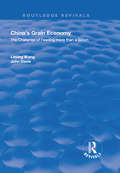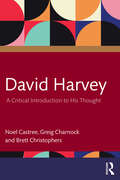- Table View
- List View
Religion in Reason: Metaphysics, Ethics, and Politics in Hent de Vries (Routledge New Critical Thinking in Religion, Theology and Biblical Studies)
by Martin Shuster Tarek R. DikaThis book presents critical engagements with the work of Hent de Vries, widely regarded as one of the most important living philosophers of religion. Contributions by a distinguished group of scholars discuss the role played by religion in philosophy; the emergence and possibilities of the category of religion; and the relation between religion and violence, secularism, and sovereignty. Together, they provide a synoptic view of how de Vries’s work has prompted a reconceptualization of how religion should be studied, especially in relation to theology, politics, and new media. The volume will be of particular interest to scholars of religious studies, theology, and philosophy.
Adivasis, Migrants and the State in India
by Jagannath AmbagudiaThis book looks at the contested relationship between Adivasis or the indigenous peoples, migrants and the state in India. It delves into the nature and dynamics of competition and resource conflicts between the Adivasis and the migrants. Drawing on the ground experiences of the Dandakaranya Project – when Bengali migrants from erstwhile East Pakistan (now Bangladesh) were rehabilitated in eastern and central India – the author traces the connection between resource scarcity and the emergence of Naxalite politics in the region in tandem with the key role played by the state. He critically examines the way in which conflicts between these groups emerged and interacted, were shaped and realised through acts and agencies of various kinds, as well as their socio-economic, cultural and political implications. The book explores the contexts and reasons that have led to the dispossession, deprivation and marginalisation of Adivasis. Through rich empirical data, this book presents an in-depth analysis of a contemporary crisis. It will be useful to scholars and researchers of political studies, South Asian politics, conflict studies, political sociology, cultural studies, sociology and social anthropology.
The Psychoanalytic Ear and the Sociological Eye: Toward an American Independent Tradition
by Nancy ChodorowIn The Psychoanalytic Ear and the Sociological Eye: Toward an American Independent Tradition, Nancy J. Chodorow brings together her two professional identities, psychoanalyst and sociologist, as she also brings together and moves beyond two traditions within American psychoanalysis, naming for the first time an American independent tradition. The book's chapters move inward, toward fine-tuned discussions of the theory and epistemology of the American independent tradition, which Chodorow locates originally in the writings of Erik Erikson and Hans Loewald, and outward toward what Chodorow sees as a missing but necessary connection between psychoanalysis, the social sciences, and the social world. Chodorow suggests that Hans Loewald and Erik Erikson, self-defined ego psychologists, each brings in the intersubjective, attending to the fine-tuned interactions of mother and child, analyst and patient, and individual and social surround. She calls them intersubjective ego psychologists—for Chodorow, the basic theory and clinical epistemology of the American independent tradition. Chodorow describes intrinsic contradictions in psychoanalytic theory and practice that these authors and later American independents address, and she points to similarities between the American and British independent traditions. The American independent tradition, especially through the writings of Erikson, points the analyst and the scholar to individuality and society. Moving back in time, Chodorow suggests that from his earliest writings to his last works, Freud was interested in society and culture, both as these are lived by individuals and as psychoanalysis can help us to understand the fundamental processes that create them. Chodorow advocates for a return to these sociocultural interests for psychoanalysts. At the same time, she rues the lack of attention within the social sciences to the serious study of individuals and individuality and advocates for a field of individuology in the university.
The Politics of Military Families: State, Work Organizations, and the Rise of the Negotiation Household (Cass Military Studies)
by Manon Andres René Moelker Nina RonesThis book examines the politics of military families in relation to the tensions between the state, military organization, and private life. It elaborates on the tensions between the advent of challenging worldwide deployment for the military and the prominence of the home front. The volume aims to understand the dynamics of conflict and change within triad figurations at the macro (society), meso (organizational), and micro (family) level and is guided by the following overarching research questions: What are the key issues in the three-party dynamics? What tensions exist in these dynamics? How do actors seek to arrive at a balance? What initiatives for change are made? With contributions from international scholars, who examine the workings of politics in military families at all three levels, the book argues that members within military families deal with shifting power balances and these are impacted by demands from organizations and the state. This book will be of much interest to students of military studies, sociology, organizational studies and politics.
When Race Meets Class: African Americans Coming of Age in a Small City
by Rhonda F. LevineA rare, 15-year ethnography, this book follows the lives of individual, low-income African American youth from the beginning of high school into their early adult years. Levine shows how their interaction and experience with multiple institutions (family, school, community) and individuals (parents, friends, teachers, coaches, strangers) shape their hopes, fears, aspirations, and worldviews. The intersectionality of their social identities—how race, class, and gender come together to influence how they come to think about who they are—influences many behaviors that directly contradict their stated aspirations. Affected, too, by limited access to resources, these youths often take a path profoundly different from their stated values and life goals. Levine explores the volatility and constraints underlying their decision-making and behaviors. The book reveals the critical junctures and turning points shaping life trajectories, challenging many long-held assumptions about the persistence of racial inequality by offering new insights on the educational and occupational barriers facing young African Americans.
Behavioural Science and Housing Decision Making: A Case Study Approach
by Helen BaoThis book takes a behavioural approach to examine six important housing questions: tenure decision, gentrification, place attachment, housing bubbles, housing wealth, and residential satisfaction. Using experimental and field data, the book demonstrates the effects of six behavioural biases and heuristics (i.e., anchoring and reference dependence, loss aversion, mental accounting, endowment effect, herd behaviours, and social comparison) on these housing decisions. The first part of the book introduces the questions and provides a behavioural science toolbox before the second part adopts a real-world case study approach. Real data sets and suggested answers are provided, and the cases come from the UK, USA, and China. Background information is given in each case to facilitate the understanding of the case data and question, as well as the discussions on the results. This book is ideal supplementary reading on a variety of courses such as housing studies, economics, real estate, research methods, and for students and academics who are interested in the application of behavioural science in housing decisions.
The Syllabus as Curriculum: A Reconceptualist Approach (Routledge Research in Education)
by Samuel D. RochaCan the syllabus constitute the curriculum? In this volume, Rocha explores curriculum theory through the lens of the syllabus. By critiquing curriculum studies and the entire field of education, overrun by the social sciences, Rocha provides an integrated vision of philosophy of education and curriculum theory, rooted in the humanities. Through an original reconceptualization, this text draws from a broad range of sources – ranging from Classical Antiquity to the present – offering a rich context for understanding curriculum as a philosophically salient concept, contained within the syllabus. The Syllabus as Curriculum features actual syllabi created and taught by the author in undergraduate and graduate courses at the University of British Columbia, Canada. These curated syllabi work as exemplars and media, supported by pedagogical commentary and context. Inspired by Augustine’s Confessions, each part of the book culminates in a metaphorical "garden," which serves as a meditation on the syllabus in three senses: correspondence, essay, and outline. An original, powerful, and corrective contribution to the literature on curriculum studies, this work invites teachers and scholars from across the foundations of education, especially philosophy of education, art education, and those invested in curriculum theory, to see their contribution in more direct and integral ways.
Urban Policy in Latin America: Towards the Sustainable Development Goals? (Routledge Studies in Development Economics)
by Michael Cohen María Carrizosa Margarita GutmanThis book evaluates the impact of 20 years of urban policies in six Latin American countries: Argentina, Brazil, Chile, Colombia, Ecuador and Mexico. It argues that evaluating the fulfillment of past commitments is essential for framing and meeting the new commitments that were taken in Habitat III over the next 20 years. Taken as a whole, the book provides a critical assessment of the economic, social and environmental consequences of urban interventions during Habitat II. The country-level chapters have been written by recognized experts in urban issues, with first-hand knowledge of the Habitat process, and deep familiarity with the problems, statistics, actors and political contexts of their nations. The latter part of the volume considers wider topics such as the Habitat Commitment Index, the New Urban Agenda and the regional and global-scale lessons that can be extracted from this group of countries. Urban Policy in Latin America will be of interest to advanced students, researchers and policymakers across development economics, urban studies and Latin American studies.
Health and Social Evolution: Halley Stewart Lectures, 1930 (Routledge Revivals)
by George NewmanOriginally published in 1931, this book explores the history of health and social evolution in the UK, including chapters on how England learned to control disease, the contribution of the eighteenth century, and the coming of democracy.
Philosophy for Children in Confucian Societies: In Theory and Practice (Routledge International Studies in the Philosophy of Education)
by Chi-Ming LamThis book contributes to the theory and practice of Philosophy for Children (P4C), with a special emphasis on theoretical and practical issues confronting researchers and practitioners working in contexts that are strongly influenced by Confucian values and norms. It includes writings by prominent P4C scholars from four Confucian societies, viz., Mainland China, Hong Kong, Taiwan, and Japan. These writings showcase the diversity of the P4C model, providing a platform for researchers and practitioners to tell their stories in their own Confucian cultural contexts. The research stories in the first part of the book are concerned with assessing the impact of traditional Confucian norms, promoting critical thinking, reconstructing the notion of community of inquiry, creating moral winds, integrating philosophy into the school curriculum, and localizing teaching methods and materials. Four issues are discussed in the second part of the book: the tension between Confucianism and powerful thinking; cultural challenges for practitioners; the transformation of harmony; and the conception of family. Taken as a whole, the book provides fresh insights into whether and how P4C’s Westerninfluenced theories and practices are compromised when they are applied in non-Western, or rather Confucian, contexts. A must-read for anyone interested in the theory and practice of P4C and Confucianism in general.
Exploring Sport and Leisure Disasters: A Socio-Legal Perspective (Routledge Library Editions: Leisure Studies)
by Hazel J. HartleyFirst published in 2001. This book provides a socio-legal analysis of disasters by setting out two sport and leisure disasters (the 1989 Hillsborough and Marchioness disasters) and considering them in their broader legal/political/economic and policy contexts. It bases the analysis on in-depth examinations of the legal responses to these disasters. The foundations for the case studies are laid by reviewing critiques of relevant contemporary legal problems. These include the concepts and contexts of disasters; the law in a liberal democracy; negligence, mass actions and policy in PTSD cases; statutory regulation of and safety; the laws of corporate reckless manslaughter and the contemporary legal problems of inquests and public inquiries into disasters. The theoretical and policy chapters are followed by the presentation of the two case study disasters, drawing on documentary sources and interviews with academics, policy makers, key legal practitioners and campaigners for legal reform, involved in these post-disaster legal processes. The analysis returns to the critical themes of the earlier chapters and ends with conclusions and recommendations for further research and legal reform arising out of this area of ‘disaster law’. Students in sport and leisure courses will be required to tackle legal and ethical issues. Law modules and courses in sport and law are developing an increasingly socio-legal, if not multi-disciplinary approach. This book takes account of this, taking a critical, multi-disciplinary approach to sport, leisure and the law. However, it will be useful to a broader group of readers who study, practice or work in the law or legal reform and apply their work to disasters.
Leisure and the Future (Routledge Library Editions: Leisure Studies #Vol. 4)
by A. J. VealFirst published in 1987. In the context of the debate about the changing structure of modem economies, the growth of leisure, and the place of work and leisure in society, this book reviews the ‘state of the art’ of leisure forecasting and the study of leisure futures. It traces man's concern with future leisure from classical and utopian writings to science fiction and ‘futurology’. Contemporary issues such as attitudes towards work and leisure, the ‘work ethic’, education for leisure and measures to share scarce jobs and increase leisure time are discussed in an objective and comprehensive manner. The more technical approaches to leisure forecasting are presented in an accessible and readable form. This book will be of value to students of leisure studies, recreation studies and public policy, to policy makers and planners working in the field, and to all those who have an interest in understanding what is happening to leisure and work in our society.
Making Commons Dynamic: Understanding Change Through Commonisation and Decommonisation (Routledge Studies in Environment, Culture, and Society)
by Prateep Kumar NayakWith an emphasis on the challenges of sustaining the commons across local to global scales, Making Commons Dynamic examines the empirical basis of theorising the concepts of commonisation and decommonisation as a way to understand commons as a process and offers analytical directions for policy and practice that can potentially help maintain commons as commons in the future. Focusing on commonisation–decommonisation as an analytical framework useful to examine and respond to changes in the commons, the chapter contributions explore how natural resources are commonised and decommonised through the influence of multi-level internal and external drivers, and their implications for commons governance across disparate geographical and temporal contexts. It draws from a large number of geographically diverse empirical cases – 20 countries in North, South, and Central America and South- and South-East Asia. They involve a wide range of commons – related to fisheries, forests, grazing, wetlands, coastal-marine, rivers and dams, aquaculture, wildlife, tourism, groundwater, surface freshwater, mountains, small islands, social movements, and climate. The book is a transdisciplinary endeavour with contributions by scholars from geography, history, sociology, anthropology, political studies, planning, human ecology, cultural and applied ecology, environmental and development studies, environmental science and technology, public policy, Indigenous/tribal studies, Latin American and Asian studies, and environmental change and governance, and authors representing the commons community, NGOs, and policy. Contributors include academics, community members, NGOs, practitioners, and policymakers. Therefore, commonisation–decommonisation lessons drawn from these chapters are well suited for contributing to the practice, policy, and theory of the commons, both locally and globally.
Film and the Afterlife (Routledge Studies in Religion and Film)
by David RankinThis book explores how post-death existence is represented in popular film, looking at issues such as continuity, personal identity, and the nature of existence beyond the grave. Film often returns to the theme of dying, death and the afterlife, both directly and indirectly, because there are very few subjects as compelling and universal. The book compares the representation of death, dying and the afterlife in films to scholarly surveys of attitudes towards life-after-death through the analysis of twenty films made between the end of World War II and now. It looks at the portrayals of stages between death and a final destination; spatio-temporal and personal continuity; the nature of afterlife existence in terms of embodiment, or not; and the contact between the worlds of the living and the dead. This book offers a wide-ranging view on a compelling subject in film. As such, it will be of great interest to scholars of Religion and Film, Religion and Media, the Philosophy of Religion, and the Sociology of Religion, as well as Religion, Media and Film Studies more generally .
Understanding Human Ecology: Knowledge, Ethics and Politics
by Geetha Devi T. V.This book examines the domain of human agency–environment interaction from a multidimensional point of view. It explores the human–environment interface by analysing its ethical, political and epistemic aspects – the value aspects that humans attribute to their environment, the relations of power in which the actions and their consequences are implicated and the meaning of human actions in relation to the environment. The volume delineates the character of this domain and works out a theoretical framework for the field of human ecology. This book will be a must-read for students, scholars and researchers of environmental studies, human ecology, development studies, environmental history, literature, politics and sociology. It will also be useful to practitioners, government bodies, environmentalists, policy makers and NGOs.
Accounting, Representation and Responsibility: Deleuze and Guattarí Perspectives (Routledge Focus on Accounting and Auditing)
by Niels Joseph LennonIn organizations, accounting produces organizational knowledge that affects decision-making and managerial action. Companies placing importance on shareholder value sometimes tend to elevate accounting to a higher truth criterion for justifying managerial actions. Yet, the nature of accounting renders it difficult to argue that accounting information necessarily produce a better basis for decision-making than arguments which are not based on accounting. This is because, as previous research has also argued, accounting counts some things but omits many others, while managers are accountable for much more than what accounting actually counts. Using a theoretical apparatus from Deleuze and Guattarí, this book illustrates that accounting-based actions such as making management decisions, maintaining organisational responsibility and hierarchical control are manifestations of the ways in which accounting is composed. This concise introduction will be invaluable for researchers and advanced students of management accounting exploring responsibility accounting and accountability.
Democratic Education in a Globalized World: A Normative Theory (Routledge International Studies in the Philosophy of Education)
by Julian CulpDue to the economic and social effects of globalization democracy is currently in crisis in many states around the world. This book suggests that solving this crisis requires rethinking democratic education. It argues that educational public policy must cultivate democratic relationships not only within but also across and between states, and that such policy must empower citizens to exercise democratic control in domestic as well as in inter- and transnational politics. Democratic Education in a Globalized World articulates and defends democratic conceptions of global citizenship education and educational justice on the basis of a democratic understanding of global justice. It will be of interest to researchers across the fields of education, political theory, philosophy, development and postcolonial studies.
Narrative Environments and Experience Design: Space as a Medium of Communication (Routledge Research in Design Studies)
by Tricia AustinThis book argues narrative, people and place are inseparable and pursues the consequences of this insight through the design of narrative environments. This is a new and distinct area of practice that weaves together and extends narrative theory, spatial theory and design theory. Examples of narrative spaces, such as exhibitions, brand experiences, urban design and socially engaged participatory interventions in the public realm, are explored to show how space acts as a medium of communication through a synthesis of materials, structures and technologies, and how particular social behaviours are reproduced or critiqued through spatial narratives. This book will be of interest to scholars in design studies, urban studies, architecture, new materialism and design practitioners in the creative industries.
Youth in India: Aspirations, Attitudes, Anxieties
by Sanjay KumarThis book explores the attitudes, anxieties and aspirations of India’s burgeoning young population in a globalised world. Drawing upon time-series survey data of the Indian youth aged between 15 and 34 years across 19 Indian states, it provides key insights into a range of themes along with an overview of the changing trends and patterns of their behaviour. The volume examines the job preferences of the Indian youth, their career priorities and opinions on reservations in employment and education sectors. It measures their degree of political participation and studies their attitude regarding political issues. It looks at aspects relating to their social and cultural contexts, preferences and practices, including lifestyle choices, consumption habits and social customs such as marriage, as they negotiate between tradition and modernity. Further, it discusses the anxieties and insecurities that the youth face, their mental health and their experiences of social discrimination. The essays here offer an understanding of a critical demographic and shed light on the challenges and opportunities that the Indian youth confront today. Lucid, accessible and empirically grounded, this volume will be useful to scholars and researchers of sociology, political sociology, political studies, youth psychology and anthropology as well as policymakers, journalists and the interested general reader.
This is Our House: House Music, Cultural Spaces and Technologies (Routledge Revivals)
by Hillegonda C. RietveldOriginally published in 1998. House music has had a considerable influence in shaping the sound of pop music from the late 1980s onwards. From underground dance events to the pop charts, traces of this aesthetic can be found in many guises. This book traces a genealogy of house and maps some of the power structures that are at play in its production and consumptoin. Places like Chicago, New York, London, Manchester, Amsterdam and Rotterdam have been visited, providing the material to discuss such subjects as contemporary dance culture, DJs and the roles of musical technologies. The author, Hillegonda Rietveld, was already steeped in dance club culture before she decided to write this loving piece of academic prose about house. Taking critical culture studies as its aesthetic fuel, she ram-raids boundaries of academic disciplines, fusing ideas like a meticulous DJing curator.
Dynamics of the Pictured Page: Representing the Nation in the "Illustrated London News" (Routledge Revivals)
by Peter W. SinnemaOriginally published in 1998, Dynamics of the Pictured Page provides a critical study of the world's first regularly illustrated newspaper, the Illustrated London News, founded by Herbert Ingram in 1842. Focusing on the first decade of this enormously influential weekly, this book situates the ILN within the publishing history of periodicals, arguing not only for a better understanding of those new modes of production engendered by an illustrated newspaper, but also for the need to theorize the relations between engraved images and printed text that constituted the ILN, which advertised itself as an unprecedented 'marriage' between art and literature. Through a series of interpretive interventions that focus on categories that would have had especially powerful reverberations for Victorian readers (for example, the home, the railway, the public funeral, and serialized literature), this book traces the newspaper's complex strategies of appeal to a middle-class English readership. This book will appeal to students of nineteenth-century literature and history (especially those with an interest in publishing history and the history of the press), as well as to Victorian studies scholars.
The Nordic Economic, Social and Political Model: Challenges in the 21st Century (Perspectives in Economic and Social History)
by Anu Koivunen; Jari Ojala; Janne HolménThe Nordic Model is the 20th-century Scandinavian recipe for combining stable democracies, individual freedom, economic growth and comprehensive systems for social security. But what happens when Sweden and Finland – two countries topping global indexes for competitiveness, productivity, growth, quality of life, prosperity, and equality – start doubting themselves and their future? Is the Nordic Model at a crossroads? Historically, consensus, continuity, social cohesion, and broad social trust have been hailed as key components for the success and for the self-images of Sweden and Finland. In the contemporary, however, political debates in both countries are increasingly focused on risks, threats, and worry. Social disintegration, political polarization, geopolitical anxieties, and threat of terrorism are often dominant themes. This book focuses on what appears to be a paradox: countries with low income differences, high faith in social institutions, and relatively high cultural homogeneity becoming fixated on the fear of polarization, disintegration, and diminished social trust. Unpacking the presentist discourse of "worry" and a sense of interregnum at the face of geopolitical tensions, digitalization, and globalization, as well as challenges to democracy, the chapters take steps back in time and explore the current conjecture through the eyes of historians and social scientists, addressing key aspects of and challenges to both the contemporary and future Nordic Model. In addition, the functioning and efficacy of the participatory democracy and current protocols of decision-making are debated. This work is essential reading for students and scholars of the welfare state, social reforms, and populism, as well as Nordic and Scandinavian studies.
Language, Ideology and Social Consciousness: Developing a Sociohistorical Approach (Routledge Revivals)
by Chik CollinsOriginally published in 1999, this book sets out to develop a distinctive, critical approach to the study of social consciousness through empirical studies of sociopolitical conflict in the west of Scotland. It accords an analytical priority to language-use and provides a critical review of a number of contemporary studies and approaches as part of an emerging presentation of an original and distinctive method. The book makes a significant contribution to the recovery for social science of the achievements of a set of Marxist psychologists and philosophers of language - most notably L.S. Vygotsky and V.N. Voloshinov - whose potential relevance for political sociology has barely been recognised. It tests and demonstrates the relevance of the approach it seeks to develop in relation to empirical studies - most notably the Upper Clyde Shipbuilders 'work-in' of 1971-72 and the Scottish Office-led urban policy 'Partnership' in Ferguslie Park, Paisley in the late 1980s and early 1990s. Ultimately, the analytical focus on language becomes a key component of a larger mode of social investigation which begins from an analysis of changing patterns of language-use - one which 'turns' to language without embracing the 'linguistic turn'.
China's Grain Economy: The Challenge of Feeding More Than a Billion (Routledge Revivals)
by John Davis Liming WangThis book was originally pubished in 2000. China is the largest developing country in the world and is still heavily based on agriculture. Currently, about 70 per cent of China's total of more than one bilion people live in rural areas, and about half of the total national labour force is involved in agricultural activities. It is clear that agriculture is the foundation for the development of the Chinese national economy. Within agriculture, the grain economy is the most important sector: indeed it has been recognised as a treasure in managing the country by all past Chinese dynasties. Ensuring enough grain supply to meet the demands of such a huge population seems to be a long-term goal for the Chinese government and this book explores whether China will be able to produce enough grain to keep pace with its population increases.
David Harvey: A Critical Introduction to His Thought
by Brett Christophers Noel Castree Greig CharnockDavid Harvey is among the most influential Marxist thinkers of the last half century. This book offers a lucid and authoritative introduction to his work, with a structure designed to reflect the enduring topics and insights that serve to unify Harvey’s writings over a long period of time. Harvey’s writings have exerted huge influence within the social sciences and the humanities. In addition, his work now commands a global readership among Left political activists and those interested in current world affairs. Harvey’s central preoccupation is capitalism and the impacts of its growth-obsessed, contradictory dynamics. His name is synonymous with key analytical concepts like ‘the spatial fix’ and ‘accumulation by dispossession’. This critical introduction to his thought is an essential companion for both new and more experienced readers. The critique of capitalism is one of the most important undertakings of our time, and Harvey’s work offers powerful tools to help us see why a ‘softer’ capitalism is insufficient and a post-capitalist future is necessary. This book is an important resource for scholars and graduate students in geography, politics and many other disciplines across the social sciences and humanities.
